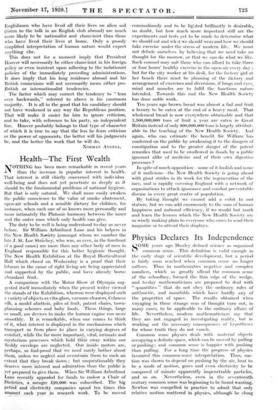Health—The First Wealth
NOTHING has been more remarkable in recent years than the increase in popular interest in health. That interest is still chiefly concerned with individua .well-being and does not yet penetrate as deeply as it should to the fundamental problems of national hygiene. But that is only natural. We shall more easily awaken the public conscience to the value of smoke abatement, open-air schools and a sensible dietary for children, for instance, when each one of us knows more personally and more intimately the Platonic harmony between the inner and the outer man which only health can give.
The duty to be well is being understood to-day as never before. Sir William Arbuthnot Lane and his helpers in the New Health Society (amongst whom we number the late J. St. Loe Strichey, who was, as ever, in the forefront of a good cause) are more than any other body of men in England responsible for this better hygienic thought. The New Health Exhibition at the Royal Horticultural Hall which closed on Wednesday is a proof that their lahourS in the cause of right living are being appreciated and supported by the public, and have already borne abundant fruit.
A comparison with the Motor Show at Olympia sug- gested itself immediately when the present writer viewed the stands of the Exhibition, whereon were displayed such a variety of objects as vita-glass, vacuum-cleaners, Celanese silk, a model abattoir, piles of fruit, patent chairs, town- planning schemes and baby foods. These things, large or small, are devices to make the human engine run more smoothly. It is remarkable, when one comes to think of it, What interest is displayed in the mechanisms which transport us from place td place in varying degrees of comfort, while the far more important, vital, intimate and mysterious processes which hold their sway within our fleshly envelope are neglected. Our inside - motors are, perhapS, so fool-proof that We 'heed i:Eirely. ',Other about them, unless we neglect and.oyerstrain them to such an extent that they break down ; but unquestionably they deserve more interest and admiration than the public is yet prepared to give them. When Sir William Arbuthnot Lane recently appealed for funds to endow a Chair of ijieteties , meagre £20,000 was subscribed. The big PetrOl and electricity. companies spend ten times this amount each year in research work. To be moved commodiously- and to be lighted brilliantly is desirable, -no doubt, but low much more important still are the experiments and-tests yet to be made to determine:what we should eat and wh it we should wear and how we should take exercise under the stress of modern life. We must not delude ourselves by believing that we need take no thought for the morrow, or that we can do what we like. Such counsel may suit those who can afford to take three or four hours' healthy exercise in the open-air every day ; but for the city worker at his desk, for the factory girl at her bench there must be planning of the dietary and arrangement of exercises and diversions, if lungs and eyes, mind and muscles are to fulfil the functions nature intended. Towards this end the New Health Society has done noble work.
Ten years ago brown bread was almost a fad and fruit a luxury to be eaten at the end of a heavy meal. That wholemeal bread is now everywhere obtainable and that 1,500,000,000 tons of fruit a year are eaten in Great Britain instead of only 800,000,000 tons is largely attribut- able to the teaching of the New Health Society. And again, who can estimate the benefit Sir William has conferred on the -public by awakening it to the dangers of constipation and to the greater danger of the patent remedies that used to be swallowed in floods by a public ignorant alike of medicine and of their own digestive processes ?
In spite of much opposition—some of it foolish and sonic of it malicious—the New Health Society is going ahead with giant strides in its work for the regeneration of the race, and is rapidly covering England with a network of organizations to attack ignorance and combat preventable disease in every great centre of population.
By taking thought we cannot add a cubit to our stature, but we can add enormously to the sum of human happiness and national efficiency, if we would but mark and learn the lessons which the New Health Society are so wisely making plain to everyone who cares to read their .magazine or to attend their displays.






































 Previous page
Previous page